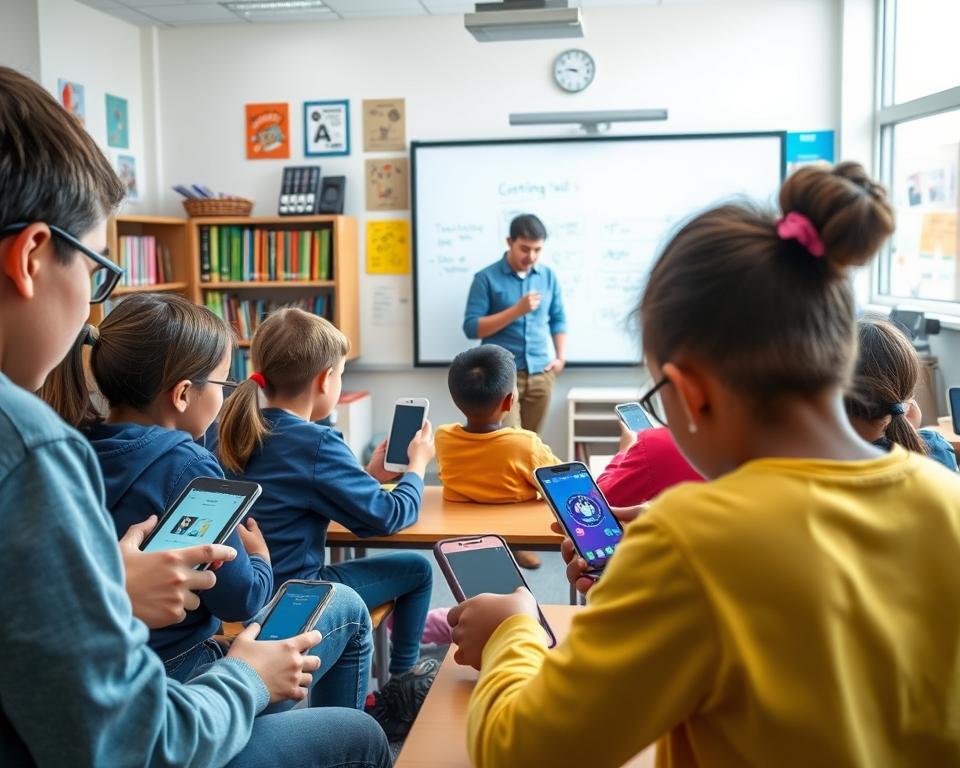
Discover the Best Uses of Mobile Technology in This Essay
Did you know that over 6.5 billion people worldwide use mobile devices, which accounts for nearly 83% of the global population? This staggering figure highlights the profound impact of mobile technology in our daily lives. In this essay, we will explore the best uses of mobile technology, uncovering how it enhances various sectors including education, healthcare, business, communication, entertainment, and social connectivity. Each of these areas showcases the remarkable benefits of mobile technology, illustrating its role in shaping a more connected and efficient society.

Key Takeaways
- Mobile technology impacts approximately 83% of the global population.
- This essay explores various sectors benefiting from mobile technology.
- Education, healthcare, and business are key focus areas.
- Mobile technology enhances communication and entertainment options.
- Understanding these impacts reveals the importance of mobile technology uses.
Understanding Mobile Technology
Mobile technology encompasses the devices and software designed for portable use and wireless communication. This mobile technology definition highlights the innovations that empower individuals to stay connected and access information anytime, anywhere. At its core, mobile technology facilitates a wide range of activities, from communication to entertainment, helping users navigate their daily lives more efficiently.
A comprehensive mobile technology overview reveals that advancements in this field have transformed how we interact with each other and our environment. Smartphones, tablets, and wearables represent just a few examples of the devices that have become integral to our lifestyles. With the ability to connect to the internet and various applications, these tools enhance productivity and maintain social connections on the go.
As mobile networks continue to evolve, the impact of mobile technology on society becomes increasingly evident. The rise of 5G connectivity promises to boost data transfer speeds and support more connected devices, further enhancing user experience and accessibility.

What are the Best Uses of Mobile Technology Essay
Mobile technology has transformed the way individuals connect and access information. Understanding mobile technology definitions provides a foundation for appreciating its vast implications in our daily lives. This section explores the pivotal milestones in the evolution of mobile technology, shedding light on how far it has come since its inception.
The Definition of Mobile Technology
Mobile technology refers to portable devices that allow users to communicate and access information regardless of their location. This encompasses smartphones, tablets, and mobile applications designed to make everyday tasks easier. Additionally, mobile technology integrates wireless communication standards that enable connectivity and data transfer.
Brief History and Evolution of Mobile Technology
The evolution of mobile technology can be traced back to significant milestones that have shaped its journey. In 1973, Martin Cooper made the first mobile phone call, marking the inception of mobile communication. As the years progressed, mobile technology evolved from bulky devices to sleek smartphones. The introduction of the iPhone in 2007 revolutionized the landscape, demonstrating capabilities beyond voice communication.
The integration of the internet into mobile phones, along with advancements in app development, fueled the rapid growth of mobile usage globally. Today, mobile technology encompasses features that include high-speed internet access, geolocation services, and various applications, enabling a seamless user experience. These developments have cemented mobile technology’s role as an essential tool in modern society.
| Year | Milestone | Impact |
|---|---|---|
| 1973 | First Mobile Phone Call by Martin Cooper | Inaugurated mobile communication |
| 1983 | Commercially Available Mobile Phones | Accessibility to the masses |
| 2000 | Introduction of 3G Networks | Enabled mobile internet and data services |
| 2007 | Launch of the iPhone | Transformed smartphones with touch interface |
| 2010s | Rise of Mobile Applications | Expanded functionality and user engagement |

Mobile Technology in Everyday Life
Mobile technology has become an integral part of our daily routines, influencing how we interact with the world around us. The rise of smartphones has transformed numerous activities, allowing users to manage their lives through various apps and services. Daily mobile technology uses include navigating unfamiliar areas with GPS, shopping online, and connecting with friends and family through social media platforms.
Statistics indicate that over 85% of adults in the U.S. own a smartphone, showcasing the substantial impact of mobile technology on daily interactions. Many individuals rely on their devices for everything from setting reminders to ordering food, demonstrating a profound shift in lifestyle and convenience.
In addition, mobile technology facilitates quick access to information. Whether researching a topic, checking the weather, or finding nearby restaurants, users experience instant gratification. As this technology continues to evolve, its influence on everyday life will likely expand further.

Mobile Technology in Education
Mobile technology has dramatically transformed the educational landscape, providing innovative and engaging solutions for students and teachers alike. This emphasis on mobile technologies supports personalized learning experiences and offers new dimensions for collaboration. The mobile technology in education essay illustrates how it shapes curricula and enhances educational technology, facilitating more dynamic learning environments.
Enhanced Learning Opportunities
With the proliferation of smartphones and tablets, students can access educational resources on-the-go. Applications designed for learning, such as Duolingo and Khan Academy, present subjects in interactive formats that make complex concepts easier to grasp. Research indicates that students using these platforms often demonstrate improved retention of information and higher engagement levels.
Access to Educational Resources
One significant advantage of mobile technology in education lies in its ability to broaden access to resources. Educational institutions can leverage this to bridge gaps in learning and provide materials to students who may not otherwise have them. Online courses and platforms such as Coursera and EdX enable learners to explore subjects across various disciplines, fostering self-directed and lifelong learning.
| Resource Type | Examples | Benefits |
|---|---|---|
| Learning Apps | Duolingo, Khan Academy | Interactive lessons, personalized pace |
| Online Courses | Coursera, EdX | Diverse subjects, accessibility |
| Collaborative Tools | Google Classroom, Quizlet | Enhanced participation, resource sharing |
By integrating mobile technology into their teaching strategies, educators can foster a culture of innovation and adaptability. This evolution in educational technology not only benefits students but also enhances the overall learning experience in today’s classrooms.

Mobile Technology in Healthcare
Mobile technology has revolutionized the healthcare sector, enabling significant advancements in how medical services are delivered. The integration of mobile solutions is particularly highlighted in telehealth services, which permit remote consultations and facilitate continuous care. This mobile technology in healthcare essay explores the transformative impact of telehealth advancements on patient care and monitoring.
Telehealth Services
Telehealth services have gained remarkable popularity, especially during the COVID-19 pandemic, when in-person visits became challenging. Virtual consultations allow patients to connect with healthcare providers without the need for travel. Various platforms and applications provide secure video conferencing features, vital for maintaining patient confidentiality while promoting easy access to medical advice. This has not only improved convenience but has also increased healthcare access for individuals in remote areas.
Mobile Health Applications
Mobile health applications are another key component of mobile technology in healthcare. These apps cater to various needs such as health monitoring, medication reminders, and chronic disease management. For example, popular apps like MyFitnessPal and Glucose Buddy assist users in tracking their daily health metrics. The growth of such applications reflects a broader trend towards personalized healthcare management, allowing patients to take active roles in managing their health.
| Feature | Telehealth Services | Mobile Health Applications |
|---|---|---|
| Access to Healthcare | Remote consultations | Health monitoring |
| Patient Interaction | Real-time video calls | Daily health tracking |
| Cost Savings | Reduced travel expenses | Management of chronic conditions |
| Convenience | Anywhere, anytime access | Personalized reminders |
The convergence of telehealth advancements and mobile health applications illustrates the relentless pursuit to improve healthcare delivery, ultimately enhancing patient experiences and outcomes.
Mobile Technology for Business
Mobile technology has significantly reshaped the way businesses operate, redefining communication and commerce practices. Organizations increasingly rely on innovative tools to stay connected and engage with customers more effectively. The benefits of mobile technology in business are profound, stemming from enhanced efficiency and accessibility.
Improved Communication
Effective communication is vital for successful business operations. Tools such as Slack and Microsoft Teams enable teams to collaborate seamlessly regardless of location. These platforms facilitate instant messaging, video calls, and file sharing, making it easier to coordinate projects and enhance productivity. Businesses that embrace mobile technology often experience improved responsiveness and collaboration among employees, reinforcing their ability to address customer needs promptly.
Mobile Commerce Trends
The rise of mobile commerce has transformed how consumers shop. Statistics highlight that a significant percentage of online shopping occurs through mobile devices, making mobile commerce benefits imperative for businesses. Companies that optimize their websites for mobile access can tap into this growing market, reaching consumers wherever they are. Ensuring a user-friendly mobile shopping experience is essential for brands looking to boost sales and customer engagement in today’s highly mobile environment.
Benefits of Mobile Technology Essay
The benefits of mobile technology essay explores numerous advantages that have transformed the way individuals interact with the world. One significant advantage is increased productivity. With smartphones and tablets, professionals can manage tasks on the go, allowing for more efficient use of time.
Enhanced connectivity is another key aspect. Mobile technology enables users to communicate instantly, regardless of location. This has made it easier to collaborate with teams and maintain relationships, leading to stronger personal and professional networks.
Access to information is vital in today’s fast-paced environment. Mobile devices allow users to retrieve data, news, and resources with just a few taps. This broad access empowers users, improving decision-making processes and fostering a more informed society.
Furthermore, mobile tech brings convenience to everyday tasks. Routine activities like shopping, banking, and even fitness tracking can now be handled via apps, saving time and streamlining processes. Overall, the advantages of mobile tech continue to shape various aspects of modern life, making day-to-day activities more manageable and efficient.
Impact of Mobile Technology on Communication
Mobile technology has reshaped the landscape of communication over the past decade. Instant messaging platforms like WhatsApp and Facebook Messenger have facilitated communication improvements, allowing users to engage in real-time conversations regardless of their geographic locations. Social media applications further amplify this trend, merging messaging with community engagement and content sharing.
Video call applications such as Zoom and Skype have transformed professional interaction, making face-to-face meetings possible from anywhere. This shift has enhanced business communications, leading to more efficient collaboration and decision-making processes. Surveys show that many people prefer these mobile technology communication methods for their convenience and accessibility.
The ability to communicate instantly has fostered stronger personal relationships as people can share experiences and maintain connections with loved ones, regardless of distance. Furthermore, the integration of mobile technology into daily routines has encouraged users to stay in touch more regularly.
As telecommunication advances, the impact on communication methods will likely continue to grow. The blend of mobile technology and social connectivity showcases the power of instantaneous interaction, shifting norms in both personal and professional realms.
Mobile Technology in Entertainment
Mobile technology has transformed the landscape of entertainment, providing users with on-the-go access to a variety of content. The rise of streaming apps like Netflix and Spotify showcases how mobile devices have changed entertainment consumption, allowing users to enjoy movies, music, and games from virtually anywhere. This shift has had a significant impact on consumer habits, shaping how individuals engage with their favorite media.
Streaming Services and Apps
Streaming apps revolutionize the way we experience entertainment by offering a vast library of content at our fingertips. In the realm of mobile technology entertainment, platforms such as Hulu, Disney+, and Apple Music help create personalized viewing and listening experiences. The convenience of these services allows users to:
- Stream content instantly without the need for physical media.
- Download shows and music for offline enjoyment.
- Access exclusive content directly from their mobile devices.
Gaming has also benefited significantly from advancements in mobile technology. Popular gaming apps, including Fortnite and Candy Crush, enable users to engage in immersive experiences while on the move. This integration of leisure and technology illustrates how streaming apps and mobile gaming continue to evolve, catering to the demands and preferences of users everywhere.
Mobile Technology and Social Connectivity
In today’s digital age, social media mobile technology plays a crucial role in forging and maintaining connections. Through smartphones, people can easily access various platforms to communicate, share experiences, and build communities. This constant connectivity through mobile devices allows individuals to interact in real-time, regardless of geographical barriers.
The benefits of social media extend beyond mere communication. Communities, both local and global, thrive as users come together to share interests and support one another. When enhanced by mobile technology, these interactions can foster meaningful relationships, creating a sense of belonging among individuals who may feel isolated in their offline lives.
Nevertheless, the impact of this technology on mental health warrants careful consideration. While social media can offer opportunities for connection, it may also contribute to feelings of loneliness or inadequacy when users compare their lives to curated online personas. Striking a balance between real-life and online interactions is essential to ensure that the advantages of social media mobile technology are fully realized.
Mobile Technology Advantages Essay
Mobile technology has transformed the way people interact with the world. The mobile technology advantages essay delves into how this innovation enhances both personal and professional lives. With impressive efficiency, mobile devices streamline communication, enabling rapid responses and decision-making.
Accessibility is another remarkable benefit. Mobile tech provides access to essential services and information irrespective of location. This capability supports various sectors, such as healthcare, education, and business. Users can manage tasks, attend virtual meetings, or access educational resources right from their smartphones.
In addition to efficiency and accessibility, mobile technology fosters countless innovation opportunities. Developers and entrepreneurs create applications that cater to diverse needs, driving market growth. This constant evolution showcases the remarkable mobile tech benefits that promote creativity and entrepreneurship.
The impact of these advantages is significant. Individuals can organize their lives more effectively, while businesses can enhance productivity and customer engagement. Ultimately, mobile technology acts as a catalyst for progress across various domains, demonstrating its vital role in shaping modern-day experiences.
Challenges of Mobile Technology
The rapid advancement of mobile technology brings numerous benefits, yet it also presents distinct challenges. Two prominent concerns, privacy issues and the digital divide, continue to impact users across the globe. Addressing these challenges becomes essential for advancing mobile technology while ensuring equitable access and user protection.
Privacy Concerns
With the surge in mobile usage, privacy issues have become increasingly critical. Mobile devices collect vast amounts of personal data, leaving users vulnerable to unauthorized access and breaches. Companies often gather information such as location, browsing habits, and personal preferences, raising questions about the ethical implications of such data collection practices. The challenges of mobile technology necessitate robust security measures to protect users’ sensitive information and reinforce trust in mobile platforms.
Digital Divide
The digital divide remains a significant barrier in the widespread adoption of mobile technology. Access to smartphones and reliable internet service varies greatly among different demographic groups. Individuals in rural or low-income areas face challenges in obtaining mobile devices and high-speed connectivity, limiting their ability to benefit from technological advancements. Addressing the digital divide requires concerted efforts to ensure that all communities have equal access to mobile resources, thereby enhancing inclusivity in the digital age.
Future of Mobile Technology
The landscape of mobile technology continues to evolve rapidly, with numerous innovations on the horizon. One of the notable future trends in mobile technology is the rollout of 5G networks, which promise lightning-fast connectivity and seamless user experiences. The integration of this technology will facilitate advancements in various applications, from enhanced streaming services to better real-time communication.
Next-generation mobile innovations such as augmented reality (AR) and virtual reality (VR) applications are set to reshape industries, offering users immersive experiences that blend the digital and physical realms. Industries like retail and tourism stand to benefit significantly from these technologies, by providing interactive experiences that engage consumers in novel ways.
Furthermore, developments in the Internet of Things (IoT) will likely enhance connectivity among devices, making day-to-day tasks more efficient. As smart home devices proliferate, the integration of mobile technology in managing these platforms will lead to a more streamlined and user-friendly experience.
As experts predict, the future of mobile technology is bright, marked by innovations that will redefine how we live, work, and communicate. Embracing these trends will not only enhance connectivity but also contribute to creating smarter environments, paving the way for a more interconnected world.
Conclusion
In wrapping up this exploration, it’s clear that mobile technology plays an essential role in modern life, influencing various sectors such as education, healthcare, and business, among others. A summary of mobile technology uses reveals that these advancements not only enhance convenience and accessibility but also foster connections that were once unimaginable. As we have discussed, mobile technology equips users with tools that empower them in their everyday activities, driving efficiency and interaction.
However, it is crucial to consider the accompanying challenges, including privacy concerns and the digital divide that may hinder equal access. In our concluding thoughts on mobile technology, it’s vital for users and developers to remain vigilant in addressing these issues while embracing innovation. As we continue to navigate this ever-evolving landscape, being informed will help us harness the benefits of mobile technology while mitigating its drawbacks.



